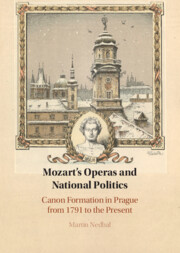Book contents
- Mozart’s Operas and National Politics
- Mozart’s Operas and National Politics
- Copyright page
- Dedication
- Contents
- Figures
- Tables
- Musical Examples
- Preface
- Acknowledgments
- Introduction
- Part I Authenticity and Ethnicity
- Part II Monuments and Politics
- Part III Translations and Adaptations
- 5 Wenzel Mihule and Don Giovanni
- 6 Die Zauberflöte and Czech National Theater
- Conclusion
- Bibliography
- Index
Conclusion
from Part III - Translations and Adaptations
Published online by Cambridge University Press: 27 July 2023
- Mozart’s Operas and National Politics
- Mozart’s Operas and National Politics
- Copyright page
- Dedication
- Contents
- Figures
- Tables
- Musical Examples
- Preface
- Acknowledgments
- Introduction
- Part I Authenticity and Ethnicity
- Part II Monuments and Politics
- Part III Translations and Adaptations
- 5 Wenzel Mihule and Don Giovanni
- 6 Die Zauberflöte and Czech National Theater
- Conclusion
- Bibliography
- Index
Summary
Although the classical canon seems static, immutable, and attached to the past, the history of the reception of Mozart’s operas in Prague shows that the canon’s social functions are dynamic and dialogic.
- Type
- Chapter
- Information
- Mozart's Operas and National PoliticsCanon Formation in Prague from 1791 to the Present, pp. 261 - 270Publisher: Cambridge University PressPrint publication year: 2023

